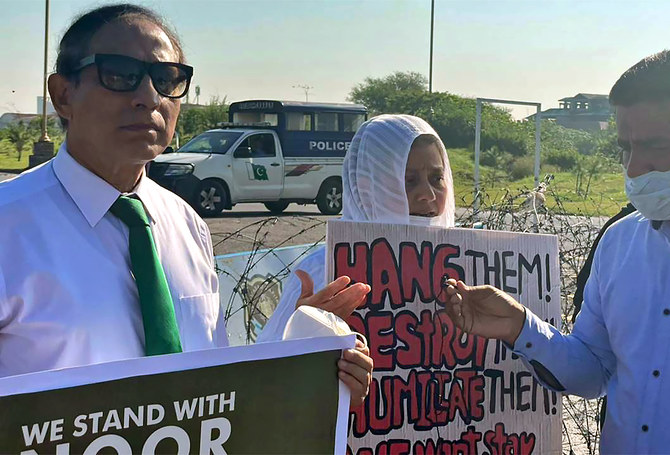ISLAMABAD: Family and friends of Noor Mukadam, a 27-year-old woman who was brutally murdered on July 20 in Islamabad, urged the judiciary to deliver swift justice in the case on Wednesday as they demanded the killer to be hanged as soon as possible.
About a dozen of these protesters gathered in front of the Parliament House as they sought early justice for Mukadam, the daughter of a former Pakistani diplomat Shaukat Mukadam, two days after the Supreme Court granted bail to Asmat Adamjee, the mother of the prime suspect, Zahir Jaffer, who, along with her husband, Zakir Jaffer, was arrested for allegedly abetting the crime.
Mukadam’s beheaded body was found at the Jaffer residence in Islamabad on July 20, after which their three household staff, namely Iftikhar, Jan Muhammad and Jameel, were also arrested.
“I am not at peace. I can’t sleep,” Kausar Mukadam, the victim’s mother, said while speaking to the media outside the Parliament House. “You don’t know, my daughter was a center of attraction in our home. I keep looking for her in my home. We won’t be at peace until we get justice.”

Noor Mukadam's family and friends hold a protest demonstration in Islamabad, Pakistan, on October 20, 2021. (Photo courtesy: Justice for Noor)
The participants of the gathering, including Mukadam’s parents, were carrying placards seeking swift justice in the case, though they also expressed confidence and trust in the judiciary.
“She [Noor Mukadam] was the youngest in our home, and we all used to treat her as a baby,” her mother said. “She was a soft spoken person who used to play with children.”
Discussing Asmat Adamjee’s bail which was granted to her for being a woman, she said: “Noor was also a woman, and I’m a mother and a woman too. I also deserve sympathy. I am hopeful the judiciary will give us justice.”
Kausar Mukadam maintained all suspects in the case were involved in the murder since none of them helped her daughter escape. “No one should get bail and they should be punished,” she said.

People seeking swift justice in the Noor Mukadam murder case hold placards during a protest demonstration in Islamabad, Pakistan, on October 20, 2021. (Photo courtesy: Justice for Noor)
Shaukat Mukadam, the victim’s father, said his family would accept the courts’ verdicts in the case, though he added that people were “disappointed with the [Supreme Court bail] decision.”
“The murderer should be hanged as soon as possible,” he said.
Separately, a district and sessions judge Atta Rabbani recorded the statement of a police witness in the case and adjourned the hearing until October 27.
As per the directions of the Islamabad High Court, the district court is required to complete the murder trial within a period of eight weeks.
The judge also snubbed Zahir Jaffer during the proceedings for violating the court’s decorum by trying to speak during the hearing.
“Don’t interrupt the proceedings,” the judge remarked while ordering the police to keep the suspect quiet in the courtroom.
His mother, Adamjee, requested the court during the proceedings to allow her to live in the F-7 residence where the gruesome murder had taken place since she had to stay in the federal capital to attend all the court hearings.
“This is your home, you can live there,” the judge said while Adamjee’s lawyer requested the court to put it on record to avoid any legal complications.















